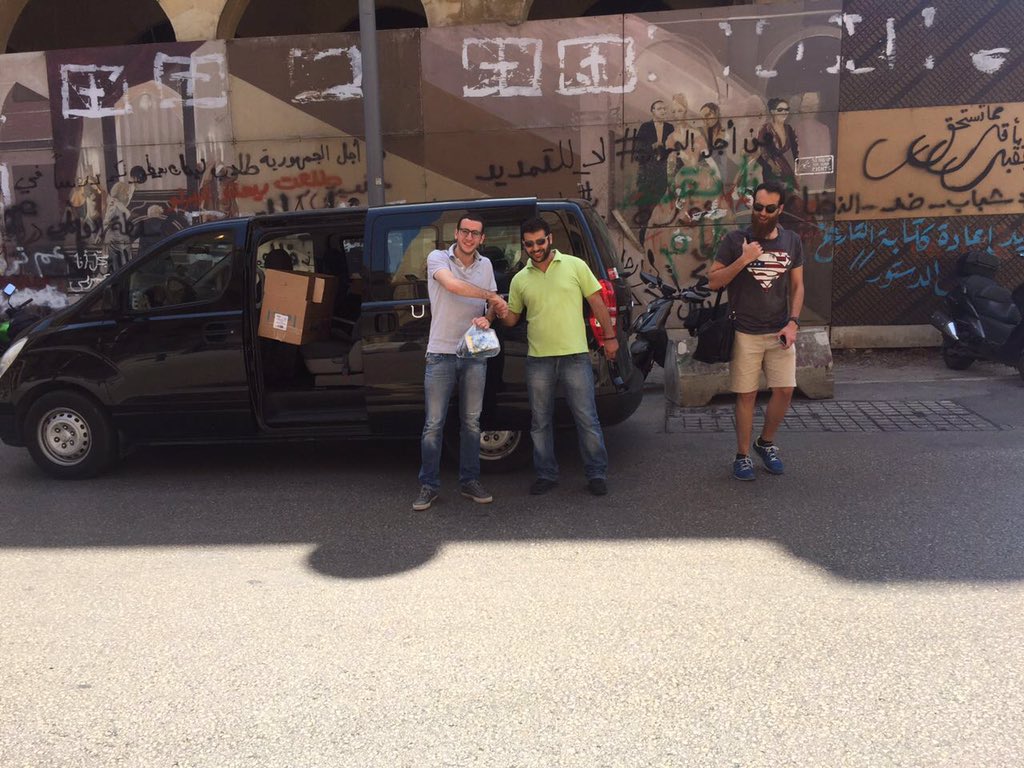
International Business Times
BEIRUT — When Hani
Darwish rolled down his car window hoping to cool off from Beirut’s hot
afternoon, he was instantly met with the sickly sweet rotting smell of
the Lebanese capital’s newest inhabitant: uncollected garbage. Despite
the stench, Darwish braved the deadlocked traffic and drove his Uber van
around the city for four hours Friday, Earth Day, so he could collect
recyclable items and help fix Lebanon’s trash crisis.
It’s been
nearly a year since the start of Lebanon’s trash crisis, the result of a
political disagreement that saw the capital’s biggest landfill close,
leaving garbage to plague the country. One solution was to promote more
recycling, but for many living in Lebanon separating one’s trash is a
luxury they cannot afford. Driving bags of plastic and paper to one of
the dozens of recycling centers is a trip that most people in Lebanon do
not think is worth the hassle of traffic. But on Friday, U.S.-based
ride-hailing service Uber simplified this process
by, literally, creating an app for that.
From 11 a.m. local time to 3 p.m. Friday the Uber mobile app in Beirut had an extra setting, “Uber Recycle,” that when
selected would request a free pickup of electronic waste, also known as
e-waste. Users entered their address and then all that was left to do
was wait for one of white Uber vans to arrive. The initiative was a
partnership with Beeatoona, a Lebanese nongovernmental organization, or NGO, focused on community based initiatives for environmental conservation.
“We didn’t think it would have that much of an effect, but I had 10
calls. Some were very far and they all had a lot of [recycling],”
Darwish told International Business Times. “It was tiring, but it was
worth it.”
Darwish was one of six Uber drivers the company chose
to participate in the recycling initiative. The six drivers received
roughly 70 requests in the four-hour window. The drivers were selected
because of their high customer ratings and were paid a separate wage for
their participation, Darwish said. He declined to say how much he was
paid for this service.
By 3:15 p.m., Darwish was finishing up his
last pickup and his van was filled with Beirut’s discarded electronics
that he now had to drop off in Dora, a suburb outside of Beirut, at one
of Beeatoona’s e-waste collection points.
E-waste, which is anything from small items like old chargers and
used batteries to larger office appliances and outdated cell phones, is
the fastest growing type of waste in the world. In 2014, 41.8 million
tons of e-waste were discarded and almost none of it was recycled,
according to a report from the United Nations University, a global think
tank and postgraduate institution.
“E-waste is classified as
hazardous waste, containing more than 1,000 toxic substances that can
contaminate the air, the water and the soil and can lead to potentially
deadly diseases,” Nadine Haddad, director of the Beeatoona, said in a
report.
E-waste is a significant part of Lebanon’s garbage
problem, but actual figures for the country are hard to come by as the
government has not collected data on waste since 2013 and has never
calculated the country’s e-waste. The Global Waste Monitor’s
latest report said each of Lebanon’s 4.15 million inhabitants produced 9
kilograms (about 20 pounds) of domestic e-waste in 2014, for a grand
total of 32,000 metric tons.
Though any recycling initiative in
Lebanon is helpful, the Earth Day efforts by Uber and Beeatoona are
likely to make only a small dent in the country’s severe waste crisis.
Protesters
gather in Beirut at a demonstration against government corruption,
which is seen as the root of the trash crisis, Sept. 9, 2015. Photo: Alessandria Masi
Until
March of this year, garbage pickup had been suspended throughout the
country for eight months, mainly because there was nowhere to put it
after the government closed the country’s main landfill, Na’ameh, last
year. Protests erupted across the country, demanding a solution to the
trash crisis.
Since the first protests last June, there have been
several attempted solutions: Civilians have tried to burn it, garbage
collectors have tried to hide it outside of city centers, experts
explored the option of converting it to fuel and the government even
tried to export it. None of these were seen as viable options, so last
month Lebanon’s Information Minister Ramzi Jreij announced that
Na’ameh would reopen and two additional landfills would be created to
accommodate the increasing trash.
Earlier this month, waste
management company Sukleen began excavating Lebanon’s trash mountains,
sorting the waste slotted to be moved. Though the government claims to
have found a temporary solution, the return of last year’s garbage smell
in Beirut is a clear sign that a great deal more needs to be done.



